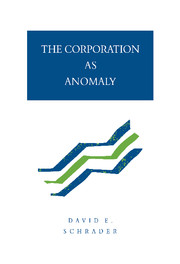Book contents
- Frontmatter
- Contents
- Preface
- Introduction
- 1 The hidden change in economic theory
- 2 Four views of scientific change
- 3 A glance at the history of economic theory
- 4 Agreement and disagreement within the tradition
- 5 Theories of the firm
- 6 Confusions and problems with the marginalist view
- 7 The shape of the large managerial corporation
- 8 The theoretical impact of a better theory of the firm
- Notes
- Bibliography
- Index
5 - Theories of the firm
Published online by Cambridge University Press: 10 December 2009
- Frontmatter
- Contents
- Preface
- Introduction
- 1 The hidden change in economic theory
- 2 Four views of scientific change
- 3 A glance at the history of economic theory
- 4 Agreement and disagreement within the tradition
- 5 Theories of the firm
- 6 Confusions and problems with the marginalist view
- 7 The shape of the large managerial corporation
- 8 The theoretical impact of a better theory of the firm
- Notes
- Bibliography
- Index
Summary
One of the classic, and at the same time most modest, defenses of the reigning economic theory of the firm was Fritz Machlup's 1966 presidential address to the American Economic Association bearing the title “Theories of the Firm: Marginalist, Behavioral, Managerial.” While any classification of theories of the firm into a few basic types will have some tendency toward artificiality, Machlup's division into these categories does succeed in drawing important distinctions. Moreover, that division seems to have come to be quite widely followed in subsequent discussion.
The reigning economic theory of the firm that Machlup defended in his address is, of course, a marginalist theory, which, of course, can be modified to give other variants. Behavioral theories of the firm are those that reject the maximization assumptions of marginal analysis and, as Machlup states it, “observe [Machlup's emphasis] how businessmen really act and by what processes they reach decisions.” Managerial theories, by contrast, take as their point of departure the separation of stock ownership and corporate control in the modern managerial corporation. These theories take very seriously the differences between the interests of stockholders and managers within a corporation. Moreover, the managerial theories recognize that modern managerial corporations frequently operate in imperfectly competitive markets, markets in which they have some substantial degree of control over prices. Because of these factors, they see the corporation as aiming at essentially managerial, rather than entrepreneurial goals, while nevertheless analyzing managerial activity on what are substantially marginalist behavioral assumptions.
In this chapter I shall follow Machlup's division of the three types of theories of the firm.
- Type
- Chapter
- Information
- The Corporation as Anomaly , pp. 91 - 109Publisher: Cambridge University PressPrint publication year: 1993



